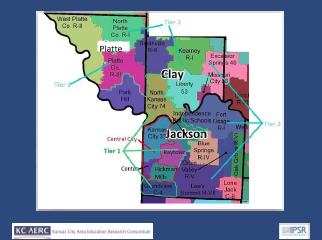Student mobility and evictions: Community issues
Student mobility -- the frequent moving and changing of schools -- has a tremendous impact on educational outcomes and well-being of children and their families.
This page contains information, including local studies, about this issue and also the related issue of evictions -- often a contributing factor to student mobility.
Both the issues of student mobility and evictions have received scant attention but have tremendous impact on children, families and neighborhoods.
Listen to a discussion on both issues which aired on KCUR.
Student Mobility in the Kansas City Area
In 2015, researchers with the Kansas City Area Education Research Consortium completed a significant local study on student mobility.
Their findings were presented at a community summit organized by Turn the Page KC and promoted a broader conversation on what could be done to reduce student mobility.
The study looked at students in Jackson, Clay and Platte counties. It found:
More than one in five students (36,000 students) changed schools in 2015.
Of those, more than 6,300 students changed schools two or more times.
Student transfers had a measurable impact on academic achievement based on student performance on the Missouri Standardized Assessment.
Students missed an average of four days between each transfer, with 10% of students transferring missing 12 or more days each move.
Download the study.
In the summer of 2017, Rosalie Swingle and Charis Moss researched and wrote a policy paper Creating Student Stability: Addressing Kansas City Evictions and Study Mobility as part of an Urban Leaders Fellowship through the Kansas City (MO) mayor's office.
Evictions illustrate this point: "Without a home everything else falls apart."
Listen to a March 9, 2016, interview with Desmond on KCUR.
Read a Kansas City Star story.
Here's a summary presentation of 17 years of court-ordered evictions in Jackson County prepared by independent researcher Tara Raghuveer.
Tara Raghuveer
Kansas City Housing Burden
The Mid-America Regional Council issued a "fair housing" report in November 2016 looking at housing in five communities -- Kansas City, Independence and Blue Springs in Missouri and Wyandotte County/Kansas City and Leavenworth in Kansas.
One section of the lengthy report looked at disproportionate housing needs.
Key finding were:
30.2% of all households had housing problems (incomplete kitchen or bathroom, more than one person per room or housing costs which were more than 30% of income)
12.6% had a severe housing cost burden and were paying more than 50% of their income on housing.
Further research
Preliminary research on evictions in the Kansas City area has been done by Tara Raghuveer, who grew up in the metropolitan area and was a student of Desmond.
Her research included field work, analyzing data from the Kansas City housing courts, and interviewing landlords and tenants.
Below is a video of a presentation she gave Nov. 7, 2017 to the City of Kansas City Mo. City Council. Get the presentation slides.
Contact us
Contact us with questions, information or concerns by completing the form.



